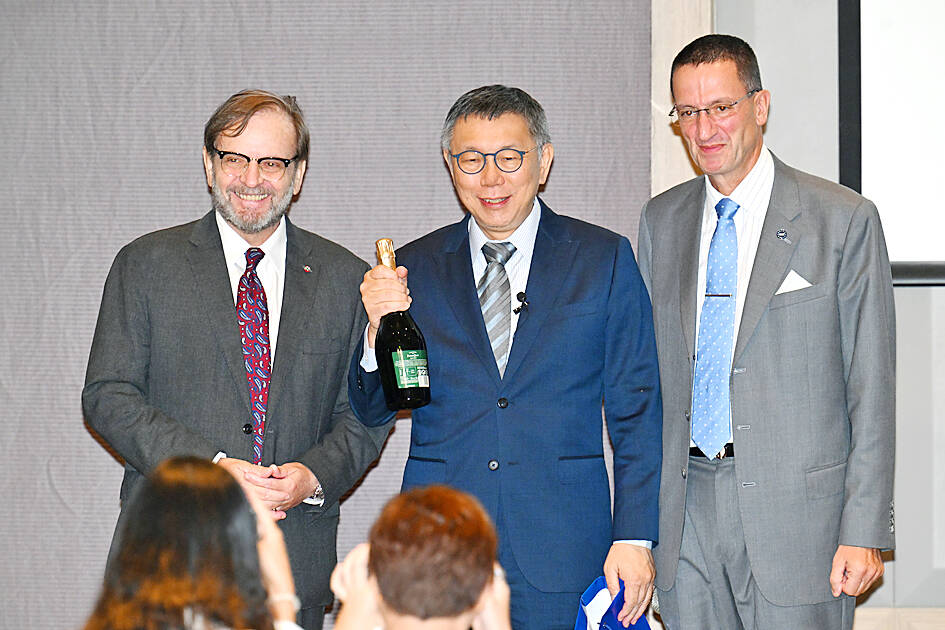The European Chamber of Commerce Taiwan (ECCT) yesterday invited presidential candidate Taiwan People’s Party (TPP) Chairman Ko Wen-je (柯文哲) for lunch to exchange views, as the foreign trade group found Taiwan lagging behind Japan and South Korea in public health expenditures.
Officials from Novartis AG, a Swiss multinational pharmaceutical company, said Taiwan spends less money on public health, compared with South Korea and Japan where people enjoy better healthcare resources and live longer.
They said that new approved drugs need a long time to hit the market and come under national health insurance coverage, denying patients better choices of medication and treatment.

Photo: Tien Yu-hua, Taipei Times
“Money used on health enhancement should be deemed as investment, instead of expenses,” they said, citing longer life expectancy and less medical need as returns and benefits.
Ko shared the observations, saying that public health spending constitutes only 6 percent of Taiwan’s GDP, much lower than South Korea’s 8 percent and Japan’s 11 percent.
Furthermore, it would take two years before approved new drugs can be bought on the market and is qualified for national health insurance coverage later, Ko added.
Ko said newly approved drugs should be put on the market right away, coming under health insurance coverage after clearing regulatory procedures online.
“Socialism should be upheld regarding public education and health regardless of economic models different countries embrace,” Ko said, adding that he would incrementally raise health expenditure to 8 percent a year if he steers the country.
The former Taipei mayor also proposed what he called a more pragmatic approach to ensure Taiwan’s energy supply stability by promoting “clean energy” to go hand-in-hand with “green energy.”
Ko said he supports the net-zero carbon emissions policy, but would adjust the power mix because heavy reliance on liquefied natural gas is unhealthy and unfeasible.
However, the TPP chairman said he would be flexible on wind farm regulations by allowing the market mechanism to settle disputes over the required technology localization.
“People in objection of the market mechanism should explain why and come up with alternative and practical solutions,” he said.
Ko added he would ease labor rules and allow more foreign workers into the nation, helping solve manpower shortages faced by assorted sectors on condition that they pay headcount taxes.

CHIP WAR: Tariffs on Taiwanese chips would prompt companies to move their factories, but not necessarily to the US, unleashing a ‘global cross-sector tariff war’ US President Donald Trump would “shoot himself in the foot” if he follows through on his recent pledge to impose higher tariffs on Taiwanese and other foreign semiconductors entering the US, analysts said. Trump’s plans to raise tariffs on chips manufactured in Taiwan to as high as 100 percent would backfire, macroeconomist Henry Wu (吳嘉隆) said. He would “shoot himself in the foot,” Wu said on Saturday, as such economic measures would lead Taiwanese chip suppliers to pass on additional costs to their US clients and consumers, and ultimately cause another wave of inflation. Trump has claimed that Taiwan took up to

A start-up in Mexico is trying to help get a handle on one coastal city’s plastic waste problem by converting it into gasoline, diesel and other fuels. With less than 10 percent of the world’s plastics being recycled, Petgas’ idea is that rather than letting discarded plastic become waste, it can become productive again as fuel. Petgas developed a machine in the port city of Boca del Rio that uses pyrolysis, a thermodynamic process that heats plastics in the absence of oxygen, breaking it down to produce gasoline, diesel, kerosene, paraffin and coke. Petgas chief technology officer Carlos Parraguirre Diaz said that in

Japan intends to closely monitor the impact on its currency of US President Donald Trump’s new tariffs and is worried about the international fallout from the trade imposts, Japanese Minister of Finance Katsunobu Kato said. “We need to carefully see how the exchange rate and other factors will be affected and what form US monetary policy will take in the future,” Kato said yesterday in an interview with Fuji Television. Japan is very concerned about how the tariffs might impact the global economy, he added. Kato spoke as nations and firms brace for potential repercussions after Trump unleashed the first salvo of

SUPPORT: The government said it would help firms deal with supply disruptions, after Trump signed orders imposing tariffs of 25 percent on imports from Canada and Mexico The government pledged to help companies with operations in Mexico, such as iPhone assembler Hon Hai Precision Industry Co (鴻海精密), also known as Foxconn Technology Group (富士康科技集團), shift production lines and investment if needed to deal with higher US tariffs. The Ministry of Economic Affairs yesterday announced measures to help local firms cope with the US tariff increases on Canada, Mexico, China and other potential areas. The ministry said that it would establish an investment and trade service center in the US to help Taiwanese firms assess the investment environment in different US states, plan supply chain relocation strategies and